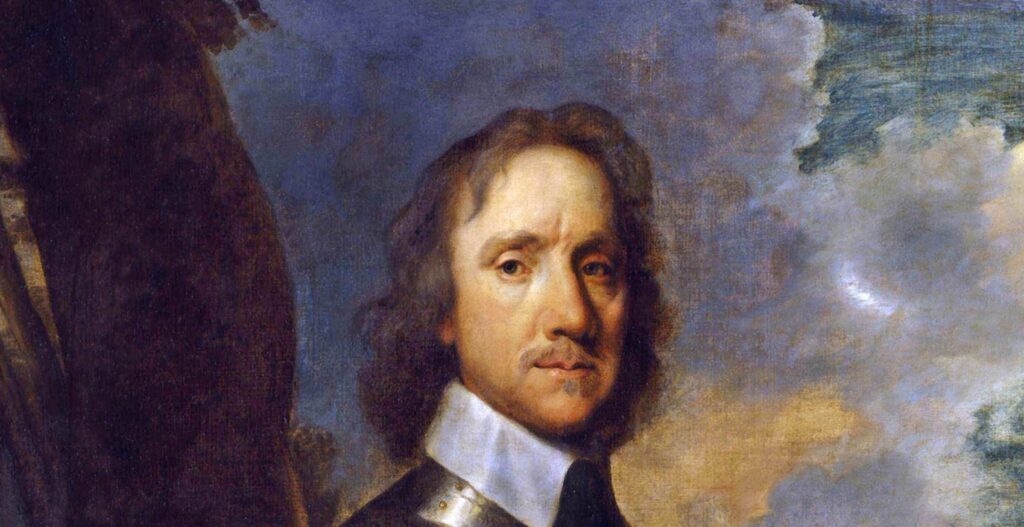To get people to maintain their morale in a war, you must get them to think less about themselves and think more in terms of the group.
Cromwell did this by adding a moral element: it is no longer just a war but a cause or a crusade.
Introduce a hated enemy that must be confronted and the army will line up united in opposition against that foe. This may be a person, a group, or even a concept (like inequality or greed).
It is when a group is truly bonded that moods and emotions become contagious, so much so that individual people make sacrifices for the sake of the group.
Make sure to lead from the front; show them the sacrifices you are making for the cause to fill them with the deep respect and desire to please you.
Understand that when an army is motivated, this can more than compensate for a lack of resources in other areas.
Cromwell’s War Becomes A Crusade
In the 1630s, Oliver Cromwell fell into a deep personal crisis. He began to suffer from severe depression and would constantly be plagued with thoughts of his own mortality.
But during this time he did make an important change – converting to the Puritan faith. Where before he was weak, indecisiveness, and directionless, now he was filled with purpose as a path became illuminated before him – God’s path.
Shortly after Cromwell became a parliamentarian and began positioning himself as a fervent supporter of the common people. Yet, he felt that he was meant for something more than politics – he envisioned a holy crusade.
In 1642, Parliament decided to stop funding King Charles I in a bitter feud. When the king refused, civil war soon broke out across the country.
Cromwell and his fellow Puritans sided against the king in favor of Parliament. He had realized that this was his calling.
Though without any military experience, he hurried off to his hometown and mustered a small force of sixty cavalry. His aim was to fight under another commander and gain that missing experience.
Ultimate victory would be his, for ultimately, God was on their side. With God’s help, he and his fellow believers would create a more pious England.
Interestingly, Cromwell turned out to be something of a military visionary. He spearheaded a faster, more mobile cavalry and distinguished himself for his bravery and effectiveness.
Trouble came however when he was promoted and given more troops.
He saw that his men did not possess the same fighting spirit he did: he watched helplessly in horror as they would break off to plunder the enemy during the thick of the fighting, and, although decent in attack, they were hopelessly disordered in retreat.
Before the battle, they would masquerade as crusaders, yet once the battle started, they were unmasked as mercenaries present only for money and adventure.
So when Cromwell was made a colonel a year later he made some radical changes.

From now on he was to only have men who were as serious about their Puritan faith as he was. He let go of the idea that only aristocrats should be officers and promoted commoners who proved themselves.
To a friend he wrote, “I had rather have a plain russet-coated captain that knows what he fights for, and loves what he knows, than that which you call a gentleman and is nothing else.”
Cromwell became stern on discipline but likewise earned the love and respect of his men by making sure they were well-fed, well-clothed, and paid promptly.
Now Cromwell’s army was a force to be reckoned with.
They were able to march in tight formation and sang psalms loudly before joining battle. They were disciplined in charging the enemy and could pull off complicated maneuvers.
When in front of the enemy they showed no fear of death for they believed God was with them. Hence, they won battle after battle.
Two years later, now a lieutenant general, his cavalry was crucial to the Parliamentarian victory at the Battle of Naseby. Days later, it was his army that finished off the Royalist forces at Langport, thus ending the first stage of the Civil War.
Interpretation
Oliver Cromwell’s reputation as a great military leader is all the more surprising given his lack of prior military experience.
Yet during the second stage of fighting, he went on to lead the Parliamentarian army, which defeated and then executed Charles I.
At the same time, Cromwell was not a particularly good strategist or tactician. His strengths lay elsewhere.
His was an army that superseded all others in morale and discipline. His men were truly committed to the cause, they joined in both mind and heart. And with every victory their bond and commitment became stronger.
So, you too should turn your battles into a crusade. Above all else, choose your staff meticulously, and pay attention to them carefully.
Choose the wrong people, and they will soon reveal themselves to be self-interested mercenaries at the first sign of trouble.
True believers are what you want; instead of glittering resumes, look at character and capacity for sacrifice. Such people are more open to your influence and discipline will be far easier to attain.
And as much as possible, turn your battles into a religious crusade, an ecstatic involvement in something transcending the present.
Footnotes & Further Reading
Greene, Robert. The 33 Strategies of War. Millionaire, 2006


